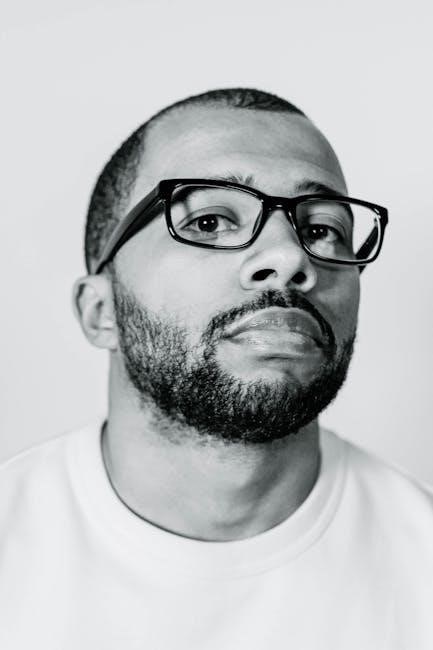The book explores the cyclical relationship between hardship and strength‚ arguing that hard times create strong men‚ while prosperity often leads to weakness․
Overview of the Book and Its Central Theme
Hard Times Create Strong Men by Stefan Aarnio explores the idea that hard times are essential for building resilience and strength in individuals‚ particularly men; The book argues that modern Western society has fostered weakness in men due to prolonged periods of prosperity and lack of challenges․ Aarnio emphasizes the importance of ownership and responsibility as key factors in reversing this decline․ The central theme revolves around the cyclical nature of history‚ where hard times create strong men‚ strong men create good times‚ and good times create weak men․ This cycle underscores the need for men to embrace adversity and lead with purpose to restore societal strength․
The Relevance of the Topic in Modern Society
The topic of hard times creating strong men resonates deeply in today’s society‚ where many argue that modern Western men are grappling with a crisis of weakness․ The book highlights how prolonged prosperity has eroded resilience‚ leading to a decline in leadership and personal responsibility․ In an era marked by societal challenges and shifting gender roles‚ the message of Hard Times Create Strong Men calls for a reexamination of masculinity and the importance of embracing adversity․ By emphasizing ownership and strength‚ the book offers a timely reminder of the need for individuals to step up and lead‚ ensuring the survival and thriving of Western civilization in uncertain times․

The Paradox of Hard Times and Good Times
Hard times create strong men‚ while good times create weak men‚ forming a cyclical pattern where hardship fosters resilience‚ and prosperity often leads to complacency and decline․
How Hard Times Foster Resilience and Strength
Hard times act as a catalyst for building resilience and strength in men․ Through adversity‚ individuals are forced to adapt‚ overcome challenges‚ and develop mental toughness․ The absence of hardship often leads to complacency‚ weakening resolve․ Modern Western men‚ shielded by prosperity‚ have lost touch with the necessity of struggle‚ fostering a culture of weakness․ Embracing ownership of life’s difficulties is crucial for reigniting strength․ By facing hardships head-on‚ men can reclaim their resilience‚ fostering a cycle where adversity becomes the foundation for growth and lasting strength․ This transformation is vital for reversing the decline of strong‚ capable leaders in society today․
The Cycle of Strength‚ Weakness‚ and Renewal
The book outlines a recurring cycle: hard times create strong men‚ who then forge prosperity․ However‚ prosperity leads to complacency‚ breeding weakness․ Weak men‚ unable to withstand challenges‚ usher in new hard times‚ restarting the cycle․ Stefan Aarnio argues that modern Western civilization is trapped in this pattern‚ with weakness pervasive among men․ The cycle underscores the importance of embracing hardship as a catalyst for renewal․ By understanding and accepting this cycle‚ men can break free from complacency‚ reclaim their strength‚ and create lasting positive change․ This cyclical truth is central to the book’s message of resilience and transformation․

The Book’s Core Argument
Stefan Aarnio argues that hard times create strong men‚ and without hardship‚ men lose their purpose and societies decline‚ emphasizing the need for resilience and ownership․
Modern Western Men and the Crisis of Weakness
Stefan Aarnio argues that modern Western men are increasingly weak‚ and this weakness threatens the very foundations of Western civilization․ He contends that a lack of purpose and ownership has led to a decline in male resilience․ Men today often prioritize comfort over challenge‚ avoiding hardship and responsibility․ This shift has created a generation of men who struggle to lead and contribute meaningfully to society․ Aarnio emphasizes that without strong men‚ societies crumble‚ and the cycle of weakness perpetuates itself․ He calls for a return to traditional values of ownership‚ accountability‚ and strength to reverse this alarming trend and restore the backbone of Western culture․
The Importance of Ownership and Responsibility
Stefan Aarnio stresses that true strength arises from taking ownership of one’s life‚ decisions‚ and responsibilities․ Modern men often shy away from accountability‚ seeking comfort over challenge․ This avoidance perpetuates weakness and hinders personal growth․ Ownership fosters resilience‚ enabling men to face adversity head-on and lead effectively․ Without it‚ complacency and dependency prevail‚ undermining societal progress․ Aarnio argues that embracing responsibility is essential for men to regain their strength and fulfill their roles as pillars of society․ By accepting ownership‚ men can break free from cycles of weakness and build a foundation of accountability and purpose․
The Role of Purpose in a Man’s Life
A man’s purpose is his driving force‚ often rooted in work and responsibility․ Without clear purpose‚ men drift aimlessly‚ succumbing to weakness and societal decline․
Work as a Man’s Primary Purpose
Work is central to a man’s identity and purpose‚ fostering resilience and strength․ It provides direction‚ accountability‚ and a sense of fulfillment‚ enabling men to contribute meaningfully to society․ Without work‚ men often lose focus and purpose‚ leading to weakness and stagnation․ The book emphasizes that a man’s work is not just about financial gain but about building character and taking responsibility․ Avoiding meaningful work can lead to a lack of direction and societal decline․ Embracing work as a primary purpose is essential for men to thrive and create lasting value in their lives and communities․

Avoiding the Trap of Being a “Unique Snowflake”

The concept of being a “unique snowflake” fosters narcissism and weakness‚ distracting men from their true potential․ It encourages self-absorption over self-improvement‚ leading to a lack of resilience and purpose․ Men should focus on shared values and collective goals rather than individualism․ By embracing discipline and responsibility‚ men can avoid this trap and build strength․ The book argues that true strength comes from unity and purpose‚ not from celebrating individuality for its own sake․ This mindset is crucial for overcoming adversity and creating meaningful impact in the world․

Leadership and Its Need in the World
The world craves strong leadership to navigate adversity․ Hard times create strong men who can lead and inspire‚ filling the leadership gap in modern society effectively․
Why the World Craves Strong Leadership
The world craves strong leadership due to the growing sense of instability and decline in accountability․ Modern society faces a void left by weak and indecisive leaders‚ leading to chaos and decay․ Hard times reveal the necessity for strong‚ resilient individuals who can guide others through adversity․ The book emphasizes that strong men create good times‚ while weak men perpetuate cycles of hardship․ Leadership is not just about authority but about taking ownership and inspiring others to act․ In a world filled with uncertainty‚ the need for strong‚ principled leaders has never been more urgent to restore order and prosperity․
How Individuals Can Step Up to Fill the Leadership Gap
Individuals can fill the leadership gap by embracing challenges and taking ownership of their lives․ The book urges men to reject the victim mindset and instead adopt a producer mentality‚ focusing on creating value․ By stepping into roles that require courage and responsibility‚ individuals can inspire others and rebuild trust in leadership․ This involves leading by example‚ making tough decisions‚ and prioritizing the greater good․ The absence of strong leaders necessitates everyday people to rise to the occasion‚ fostering resilience and accountability․ Through these actions‚ individuals can transform adversity into opportunity and help restore the strength needed to navigate hard times effectively․

The Legacy of Strong Men
Strong men leave a lasting impact‚ shaping the future through their resilience and leadership‚ inspiring generations to embrace strength and continue the cycle of renewal and progress․
How Strong Men Shape the Future
Strong men play a pivotal role in shaping the future by building resilient societies and inspiring others to embrace challenges․ Through their leadership and vision‚ they drive progress and create lasting legacies․ The book emphasizes that strong men not only overcome adversity but also pave the way for future generations to thrive․ By taking ownership of their lives and responsibilities‚ they set a foundation for prosperity and stability․ This cycle of strength and renewal ensures that the impact of strong men endures‚ influencing the world long after their time․ Their contributions are not just individual achievements but a collective force that molds the future․ Resilience‚ leadership‚ and responsibility are the cornerstones of their lasting legacy․
The Long-Term Impact of Individual Strength
Individual strength has a profound and lasting impact‚ extending beyond personal achievement to shape communities and generations․ Strong men create ripples of resilience‚ inspiring others to embrace challenges and grow․ Their legacy is not measured by immediate success but by the enduring values they instill․ Through ownership and responsibility‚ they build foundations that withstand time‚ fostering a culture of courage and determination․ The book highlights how individual strength becomes a collective force‚ driving societal progress and ensuring that the lessons of hardship are not forgotten․ This lasting influence is a testament to the power of personal fortitude in creating a stronger‚ more resilient world․ Strength‚ therefore‚ is not fleeting but a lasting testament to the human spirit․
The Concept of Modern Masculinity
Modern masculinity is defined by strength‚ ownership‚ and purpose‚ emphasizing resilience and responsibility in a world where traditional roles are evolving‚ yet core values remain essential for societal stability․
Defining What It Means to Be a Man Today
Modern masculinity is rooted in strength‚ resilience‚ and responsibility‚ emphasizing a man’s role as a provider‚ protector‚ and leader․ It rejects the idea of being a “unique snowflake” and instead focuses on embracing purpose and ownership of one’s life․ The book argues that being a man today means transcending superficial traits and embodying character and discipline․ This definition challenges modern societal expectations‚ urging men to step away from weakness and reclaim their role in shaping a stronger future․ By aligning with these principles‚ men can rise above the cycles of decline and foster a world where strength and leadership thrive․
Money‚ Sex‚ Religion‚ and Politics in Modern Masculinity
The book examines how traditional pillars of masculinity—money‚ sex‚ religion‚ and politics—shape modern male identity․ It critiques the notion that these elements define a man’s worth‚ arguing instead for a focus on character and strength․ The author asserts that men must reclaim their roles in these areas with purpose and integrity‚ rather than being swayed by societal expectations․ By redefining these aspects‚ men can build a stronger sense of self and contribute to a more resilient society․ This perspective challenges modern norms‚ emphasizing the importance of leadership and responsibility in today’s world․
The book’s enduring message emphasizes that hard times create strong men‚ urging men to embrace strength‚ purpose‚ and leadership to rebuild society and secure a resilient future․
The Enduring Relevance of the Book’s Message
The book’s message remains timeless‚ emphasizing that hard times create strong men‚ while prosperity fosters weakness․ This cycle‚ rooted in history‚ highlights the need for resilience and leadership in modern society․ By advocating for ownership and responsibility‚ the book challenges men to redefine masculinity and embrace their purpose․ Its raw‚ politically incorrect approach resonates across generations‚ urging individuals to step up and fill the leadership gap․ The concepts of legacy and the long-term impact of strength underscore the book’s relevance‚ making it a powerful call to action for men seeking to reclaim their roles in shaping a stronger future․
A Call to Action for Men to Embrace Strength
The book issues a compelling call for men to embrace strength‚ urging them to move beyond complacency․ It challenges modern Western men to recognize the decline in masculinity and take ownership of their lives․ By rejecting the notion of being a “unique snowflake‚” men are encouraged to focus on work as their primary purpose․ The book emphasizes the importance of leadership and the need for strong men to step up and fill the void․ Through its raw and unfiltered message‚ it inspires men to redefine their roles‚ embrace resilience‚ and contribute to a stronger‚ more resilient society․ This call to action is both urgent and transformative․
